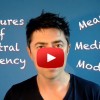067: Leigh Caldwell on Cognitive Economics and the Mathematics of Behavioral Economics
 Leigh Caldwell is a behavioural economist based in London.
Leigh Caldwell is a behavioural economist based in London.
Leigh, together with Elina Halonen, runs the Irrational Agency, which takes the latest scientific discoveries in psychology and behavioural economics, blends it with their hands-on experience of marketing and business, and turns them into powerful, incisive market research techniques.
In 2012, Leigh condensed his experience in pricing and the marketing of several of his businesses into a new book The Psychology of Price: How to use price to increase demand, profit and customer satisfaction.
Leigh is co-founder of the London Behavioural Economics Network, writes for the Pricing Revolution and the Knowing and Making blogs, and regularly features as an economics commentator on BBC News, Radio 4, Research Magazine and other media.
My own background is all about intellectual challenge. I went to university early as a teenager. I studied maths and physics. I was always into pushing myself intellectually and finding the next challenge to take on – Leigh Caldwell
Economists:
In this interview, Leigh mentions: Elina Halonen, Dan Ariely and George Lowenstein.
Economics:
In this interview, Leigh mentions: Behavioral economics, experimental economics, lab experiments, demand curve, equilibrium, utility, mathematics, rationality, nudge, choice architecture, cognitive economics, reference pricing model, anchoring, hyperbolic discounting, heuristics, neuroeconomics, Nudge Unit, organ donation, tax collection, productivity, GDP and unemployment.
In this episode you will learn:
- why Leigh help co-found the London Behavioural Economics Network (LBEN).
- the importance of academics and practitioners working together to further the discipline of economics.
- why finding the sweet-spot between controlled experiments and realism is difficult yet important.
- what cognitive economics is and how different it is the behavioral economics.
- whether big data could influence an individuals consumption behaviors.
- about the need to use the mathematics of computer science in behavioral economics.
- why we shouldn’t use the current maths of economics to explain human behavior.
- why a lack of mathematics is holding back the discipline of behavioral economics.
- why mathematics is essential for theorising and modelling economics, especially behavioural economics.
- about the paradox of self-awareness in cognitive economics when faced with choices.
- how a consumers relationship with a material object is a unique experience and how putting a price on the good can ruin this experience.
- why charging a higher price for your product or service would generate higher profits in a perceived perfectly competitive market.
- whether the 99p or 99 cent pricing strategy works.
- about the reference pricing model and why charging $39 for a product is better than charging $34 for the same product.
- about the importance of setting prices when considering how numbers are spoken, i.e. numbers with more syllables are received to be more expensive than those with fewer syllables.
- how Leigh uses the findings in academic papers to make money for his business.
- how Leigh uses economic conferences to network, to find out about the latest research and to discover the new academic societies that have been established.
- about Leigh’s goal for 2016 to start a Cognitive Economics Society.
- about the advice Leigh would give the UK government to apply cognitive and behavioral economics to deal with some aspects of social life.
- how the UK government changed people’s behaviour about paying their taxes on time.
- about the productivity challenge the UK government is facing today and what can be done about it.
- about the current research Leigh is undertaking regarding where our preferences come from.
Conferences:
Books:
- The Psychology of Price: How to use price to increase demand, profit and customer satisfaction by Leigh Caldwell.
- Predictably Irrational by Dan Ariely.
- Basic Instinct by Pete Luhn
- Nudge by Richard Thaler
- Thinking, Fast and Slow by Kahneman and Tversky
Podcast: Play in new window | Download
 079: Bryan Caplan on Parenting, the Case Against Education and the Rational Voter
079: Bryan Caplan on Parenting, the Case Against Education and the Rational Voter 070: Chronis Lalas on Prospect Theory and ‘Making a Behavioral Economist’
070: Chronis Lalas on Prospect Theory and ‘Making a Behavioral Economist’ 105: Jana Gallus on the Economics of Non-Financial Awards and How Editor Retention on Wikipedia Can Be Maintained
105: Jana Gallus on the Economics of Non-Financial Awards and How Editor Retention on Wikipedia Can Be Maintained 006: Andrew Heaton on Using Comedy to Explain Economic Concepts
006: Andrew Heaton on Using Comedy to Explain Economic Concepts 053: Helena Norberg-Hodge on Localisation, Trade Treaties and the Economics of Happiness
053: Helena Norberg-Hodge on Localisation, Trade Treaties and the Economics of Happiness 051: Eyal Winter on How Excessive Giving Ensures the Survival of the Human Race and on the Beautiful Mind of John Nash
051: Eyal Winter on How Excessive Giving Ensures the Survival of the Human Race and on the Beautiful Mind of John Nash 050: Dan Ariely on Irrational Behavior and the Importance of Our Environment When Making Decisions
050: Dan Ariely on Irrational Behavior and the Importance of Our Environment When Making Decisions 069: Diane Coyle on GDP, Its Shortcomings and Alternative Measures
069: Diane Coyle on GDP, Its Shortcomings and Alternative Measures How to Calculate Statistics Using Excel
How to Calculate Statistics Using Excel 085: Michael Roberts on Understanding Karl Marx and His Thinking on Capitalism
085: Michael Roberts on Understanding Karl Marx and His Thinking on Capitalism